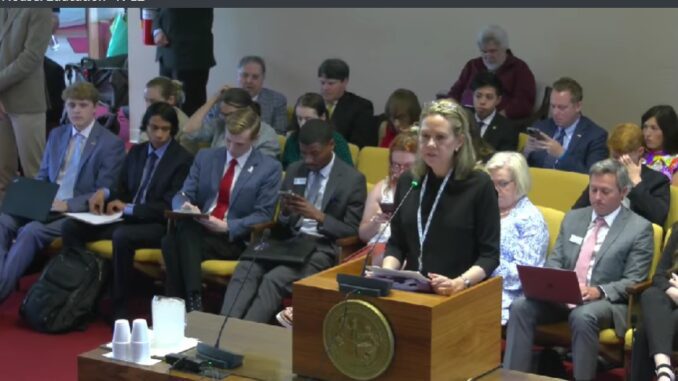
RALEIGH — The Senate’s Parent’s Bill of Rights (Senate Bill 49) finally saw some movement as the House K-12 Education Committee gave a preferred committee substitute (PCS) to the bill a favorable report on June 21.
Senate Bill 49 seeks to increase transparency in several areas such as the well-being of students, curriculum, and medical records, as well as enumerating 12 rights for parents that include the right to direct the child’s education, care, upbringing, and moral or religious training.
Those 12 rights also include requiring parental consent for reproductive health education programs or surveys, opting out of data collection efforts, the right to seek medical or religious exemption from immunization requirements, and the right to inspect records, books, or other materials.
The PCS that was approved made minor changes, such as removing school transportation from the prohibition on recording minors without parental consent. That change was made because most school buses have cameras installed for the safety of the students and the driver.
Another change in the PCS on parental consent for the health care of a minor adds a person standing in loco parentis to guardian and parental definitions.
Senate Bill 49 was first filed at the end of January this year and passed the Senate in early February but had sat in House committees until finally being heard by the House K-12 Education Committee last week.
Senate Bill 49 is similar to the Parents’ Bill of Rights (House Bill 755) that was filed during the 2021-22 legislative session. One difference between the two bills is that Senate Bill 49 prohibits gender identity and sexuality discussions or lessons in grades K-4 whereas the previous bill only barred those topics for K-3. Fifth grade was excluded from Senate Bill 49 due to the introductory discussions in the grade on puberty and reproduction. Under state law, health classes covering those topics in more depth begin in seventh grade.
In an interview earlier this year with North State Journal, House K-12 Education Committee Co-Chair Rep. John Torbett (R-Gaston) indicated the House may present its own version, but given the recent approval by Torbett’s committee, it would appear the Senate version will be the only one.
During the June 21 meeting, Torbett and other members of the committee pressed the bill’s primary sponsor, Sen. Amy Galey (R-Alamance), on whether the bill had adequate enforcement ability.
Torbett asked Galey if there was anything punitive in the bill for bad actors not following the law.
Galey replied that employees of the state “may be subject to disciplinary actions.” She also said the bill is really designed to give parents information on their rights and not to punish. She added that “one would hope school boards will give the parent the power to advocate for their child.”
Torbett pressed the question, asking what happens if someone has made statements that they won’t follow the law. Galey responded by saying some elected officials don’t uphold their oath of office and gave the example of some school boards that were already not following laws like the state’s calendar law. She said she thinks “they should be held accountable by the voters.”
At least one teacher has been cited as stating they will refuse to follow the law if passed.
An attendee of a May 24 “Pride in the Profession” event held by Orange County Public Schools’ Chief Equity Officer Lee Williams shared their notes with North State Journal. That meeting included conversations about the Parents’ Bill of Rights. The notes shared with North State Journal cite fifth grade River Park Elementary teacher Billie Markham as stating, “Teachers are already saying they are not going to obey the law if it is passed; I won’t be recognizing it.”
Orange County Schools was contacted for comment but did not provide one on Markham’s statement other than to say “Senate Bill 49 is not law in North Carolina. The district has no comment on a hypothetical scenario.”
Rep. Cynthia Ball (D-Wake) also asked Galey what recourse a parent has if a teacher, school, or district disregards the law.
Galey’s response was similar to what she had told Torbett in that an employee could be subject to disciplinary action by the school or district. She added that if the conflict is not resolved within 30 days the parent can notify the state board of education to request a hearing, and that under the bill the parent could request a declaratory judgment action and the court could award costs and attorney’s fees as part of an injunctive relief.
Under the bill, districts must inform parents of any health care or counseling services their child receives or requests. There is also a requirement for parents to be notified if their child requests a name change or demands the usage of gender-identity-style pronouns.
Rep. Julie von Haefen (D-Wake) called the bill “overly broad” and seemed opposed to the bill’s requirement on medical or counseling requests.
“The mandatory notification requirements before a student can receive counseling is going to have a chilling effect at a time when we have discussed in this committee so many times about how we’re all concerned about the mental health of our students,” said von Haefen. “This is going to basically discourage them from disclosing that need for help.”



